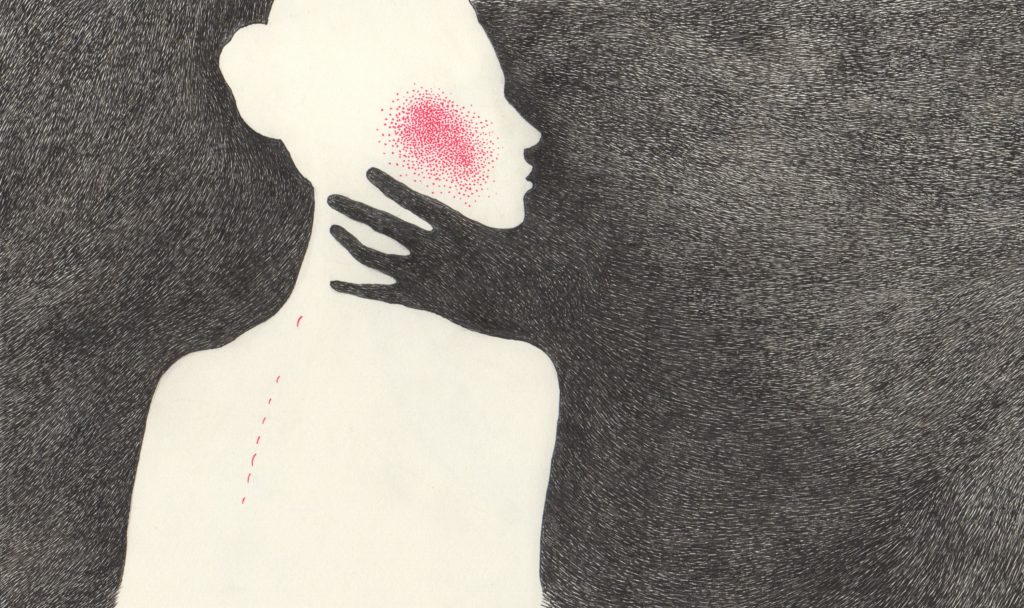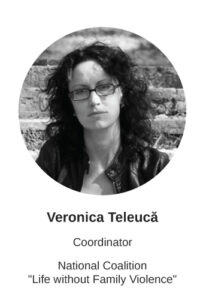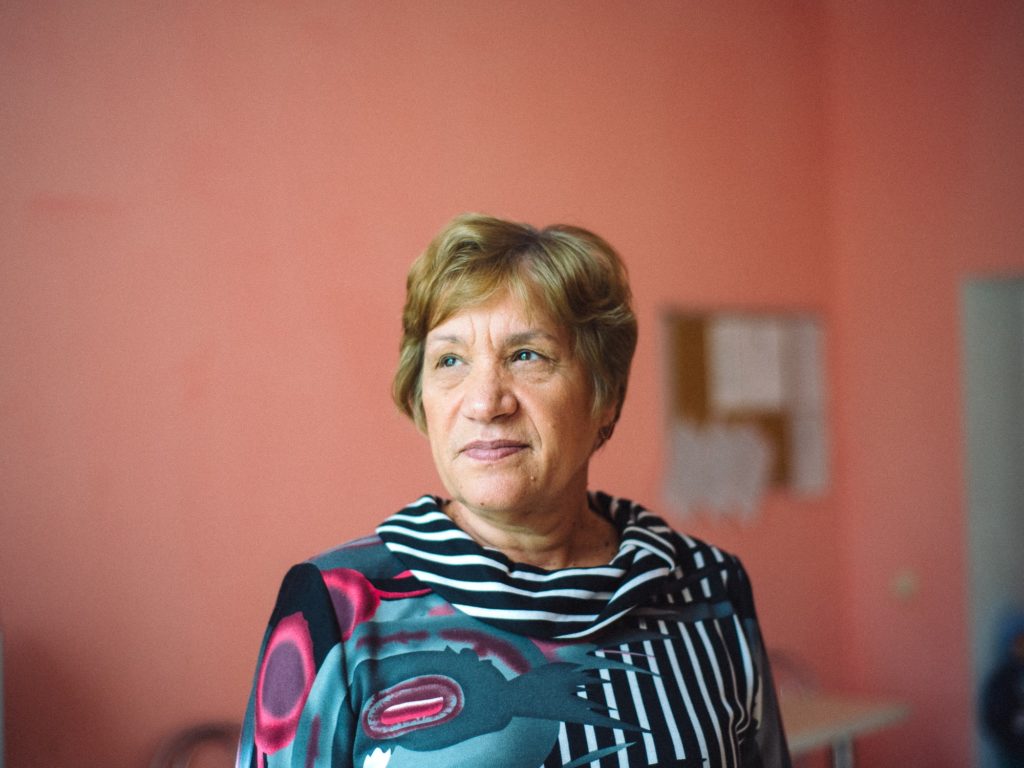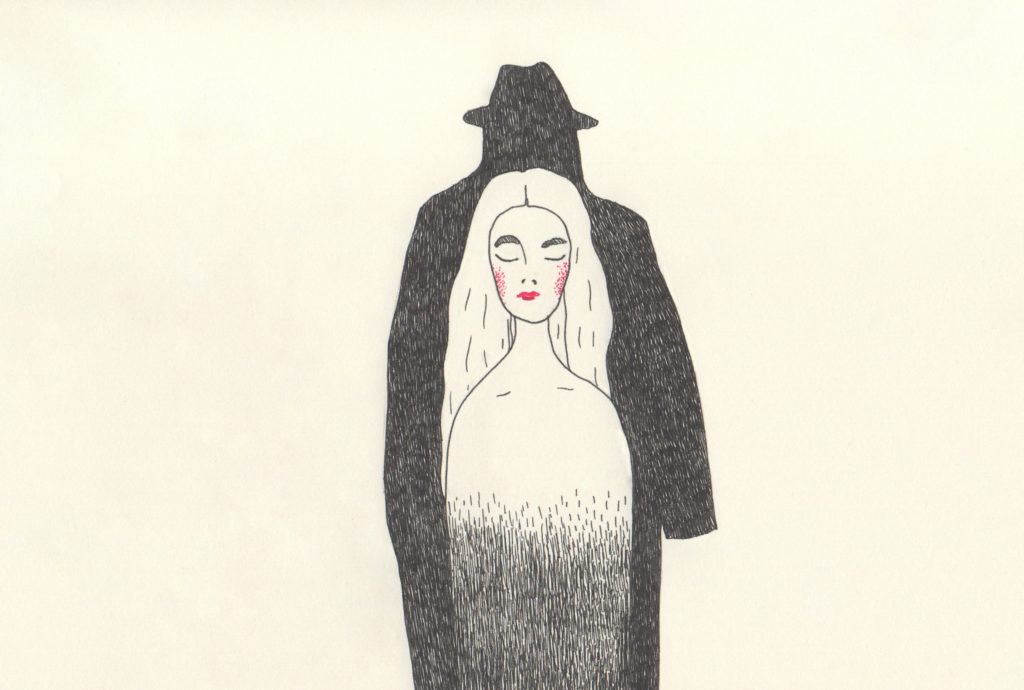That night of November, Marina was waiting for Oleg to get home. She was happy. After five years of relationship, the two got married. Their wedding in a restaurant in Căușeni was just over. Marina was still wearing the white dress, decorated with flowers, and the blond, shiny, hatched hair.
When Oleg entered the door, the woman asked him if he had brought all the presents. “I brought them, but you have smiled too much to some at the wedding”, it was heard from the other room. Marina was stunned. “The guests had to be welcomed, I had to answer…”, she murmured. When they went to bed, the fight started. “I saw how you intersect your eyes – you and the one there!”. After the arguments turned into shouts, the first hit followed. Marina felt a deaf pain in the back of her head. She turned on the other side, and as she swallowed her tears, fell asleep. It was the first hit in her life. After that night, 11 years of violence followed.

Every second woman in Moldova, aged between 15 and 64, has been assaulted at least once in the course of her life. Abuse can be of different types: physical, sexual, verbal, emotional, financial. Domestic violence does not stop by itself, it only grows over time, experts say.

“As time passes, the personalities of the victims and the aggressors are changing. It is more and more difficult for women to leave”, explains Veronica Teleucă, coordinator of the National Coalition “Life without Family Violence”. The victim can stay with the aggressor for several reasons: she is financially dependent, does not want to leave her children without a father, does not trust the authorities can help her or, guided by the traditionalist views of society, believes that if a woman is beaten – she deserves it.
Marina met Oleg at the age of 17. The boy noticed her at a school party and told through a friend that he likes her. Several evenings later, he came to her gate. Since that evening, they have been considered a couple. “I grew up in a fine family, my father was pretty severe”, recalls the woman. “I knew that: if you meet a boy, that’s him”. Soon Oleg left for work to Moscow, and the young woman came to Chișinău to continue her studies. Then the first scenes of jealousy began.
Oleg constantly said “to be good”, Marina did not go against this rule. Every Thursday, she went to the telephone booths in the city center to call Moscow. There, at the counter, she gave all the money she saved from her scholarship, and the operator told her how many minutes she could talk. Oleg was calling her at the dormitory very rarely.
“I thought he loved me”, remembers the woman today. Marina is short and lean, has straight hair and twisted eyelashes at the top. Nobody believes her when she says she’s 34 and she has two children. “In 2003, I finished my studies. A year later, we had the wedding. Another year later, Mihăiţă appeared, our first child”, the woman continues.
During the maternity leave, Oleg became greedy and possessive. He would ask “Where have you been? How much you paid? Why so much? Show me all the checks!”. After taking the child to the kindergarten, the woman was hired as a secretary. Many of her colleagues were men, and this was the reason for her husband’s jealousy. Physical abuse was more and more common.
All the hits were directed to the head, where no traces remain. “He slapped my head, punched it with his fist… It was important to him that I could go out to work”, says the woman. The situation did not change either after the appearance of the second child, four years later. Oleg’s jealous crises were gradually out of control. He was beginning to invent stories. “I saw you coming out of a black car today. Whom did you walk with?”, he would ask, screaming as his eyes filled with blood.
Jealousy is one of the most common causes of domestic violence. “It comes, most of the time, from lack of self-confidence, which, in turn, causes distrust in the other”, explains psychologist Tatiana Chirev. Jealous people consider their partners a property they want to control. “When they fail, they can become violent or they can make up something to regain control”, the expert concludes.

Six years after the wedding, Marina ran away from home for the first time. Oleg felt bad, and the woman arranged for him an appointment at the surgeon. They got to the hospital at lunchtime. Timid, with a shy smile, Marina knocked at the doctor’s door and asked to offer them ten minutes of his time. After they left the office, Oleg changed his face. With his lips tightened and clenched fists, he threw at her: “I did not like the way you smiled at him”. Marina, for the thousandth time, tolerated that and, with a hard heart, has returned to work.
“I knew, if I go home, I’ll have my head hurt. I called the kindergarten and asked the educators to dress up my children”. In a hurry, they took a taxi and went to Chişinău, to her brother. When he realized that Marina was missing, Oleg searched for her at all of her relatives. “He called me restlessly for two days. He told me that he would end his life”, recalls the woman. On the third day, the phone did not ring. Marina took her children and ran home. Heavily breathing, she entered through the door. On the table, there was a stack of dirty dishes. Oleg greeted her laughing. He said “What, did you run away? You’ve come back to me again!” before he kicked her.
***
In last years of marriage, Oleg was abusively drinking pure alcohol. He was buying alcohol at the store and was diluting it with water. He would pour the mixture into bottles, which he hid in the house. Marina found them and changed their place, spilled them or added chlorine in them. Annoyed, the man was telling her he would have to buy his alcohol again and waste money. Sometimes, he would buy vodka in 100 ml glasses. On a Saturday, while cleaning in the garden, Marina found over one hundred glasses, piled up.
The children suffered in silence. Sometimes, on the way to the kindergarten, they asked Marina: “Mommy, my dad is drunk?”. The woman sighed and told them she did not know. Although he never abused them, Oleg never spent too much time with the little ones, and they understood that their father was not like other children’s fathers.
Drinking alcohol was amplifying his jealousy, turning it into a kind of madness. Marina understood that Oleg was delirious when she found him crying in the back of the garden. Behind their old house in Căușeni flows a stream of a few meters wide with mud and muddy water. The man crossed to the other bank and laid several wooden boards across the stream. “Where did this bridge come from?”, I asked him. He told me that I had built it so that my lovers would not come in front of my house and that they are not seen by the neighbors”, Marina says.
Oleg had his eyes swollen from weeping and his red face, burning. He asked her why she was doing it and pulled her by the coat. He pulled her into the house and hit her many times, many times. It was the worst fight ever since. “Half my head swelled, my back was bloody. I thought I could not go out”, recalls Marina. In that moment she realized she needs to escape somehow.

A friend told her about the “Pro Familia” Maternal Center in Căuşeni, which offers help to victims of domestic violence. The organization provides psychological, medical and legal assistance. Victims can get shelter for a period of one month to half a year. “Women here are unraveling, they start crying, they understand they have a problem to solve. We offer accommodation, clothing, food, hygiene products. Together with the specialists, we develop a service plan”, says Tatiana Osadci, director of the center. Since the founding of the center, ten years ago, about 800 mothers and their children have been helped.

Marina could not accept the idea of fleeing from home, moving to the center, divorcing and taking her husband’s children. She was too afraid of him. What if he kills her? She, however, went to the Center, where she met other women and sneaked up into meetings with the specialists.
“Here I understood I have to document the abuses, so I went to the doctor. I decided to divorce and look for a rented house for me and my children”, says the woman. She used all the money she had set aside to pay the rent of a small apartment without furniture in the kitchen and two old beds.
All this happened in early 2016. At that time, victims of domestic violence could only request a protection order – an act issued by the court, which obliges the aggressor to leave the home and stay away from the victim for a maximum period 90 days.
But the system had gaps. “When the policemen were called on the spot, the woman, being in this tense situation, with the aggressor beside her, said that everything would be fine”, explains Veronica Teleucă, Coordinator of the National Coalition “Life without Family Violence”. The policemen were leaving because they were not allowed to intervene. “There were cases when, in the morning, there were calls that somebody in the house died and that was, in fact, the victim of violence,” says Veronica Teleucă. Annually, about 30 victims of domestic violence are killed.
Only in one year, in March 2017, there came into force the law that allows the policeman to immediately remove the aggressor for a period of ten days. The aggressor is taken out of the house, even if it belongs to him. Specialists say it is an effective measure to calm the aggressor and avoid repetition of violence. In addition, the victim wins the time to request the protection order issued within a maximum of 24 hours. During the first eight months of 2017, the Police issued 1135 restraining orders and oversaw 383 protection orders.
***
On February 13 at night, a new quarrel broke out in Marina’s home. Oleg grabbed her neck and stuck her against the wall, hitting her several times. “While he was beating me, I was saying to myself: I have the key, it’s the last hit I tolerate!”. The children were crying aside. The little girl was trying to hug her father: “Daddy, do not beat Mom, please”. Oleg pushed the girl gently aside while Marina was lying on the ground.
The next morning, Marina announced Oleg that she was leaving. She took the clothes bags out of the closet, prepared several months ago. She took the children by the hand and headed for the door. Oleg shouted back to them that they would still come back to him. He hid their winter boots. Marina put the children in rain boots and walked out the gate. After they got to their new home, the woman wrote a complaint to the police. Over a day, the protection order was ready. Marina had wings.
Although he could not find them, Oleg called her constantly. “He humiliated me, he told me I was nobody. That he would find me and cut my throat, he would kill me with an axe”, remembers Marina. Soon the woman filed for a divorce. Oleg did not appear at any court hearing, nor did he contribute in any way to the maintenance of the children. So far, he owes Marina over 15 thousand lei.
After the protection order expired, the man followed the children at school. Marina heard them on the phone, alert. “Mom, Dad chased us, we are afraid!” The small flat meant for them a safety cell”, continues Marina. The woman requested the second emergency order, which the man dared to violate. One night, he came to their place, drunk, and beating in the door. Marina called the police, and Oleg received two years of suspended custody. If he violates the ordinance once, the man will go to jail.
***
Marina has managed to escape from the circle of violence, but many other women still remain prisoners. To cope with the phenomenon, Moldova needs at least 175 shelters for victims of violence and specialized centers in uncovered areas, such as Gagauzia. Equally important is the decent remuneration of social workers. “A specialist gets 2200-2300 lei. If the salary reaches at least 4,000 lei … But now, they go abroad”, says Pro Familia Center director Tatiana Osadci.
At this moment, all that Marina wants is to see her healthy children. Being witnesses of violence for many years, they have been deeply traumatized. They have nightmares, fears they learn to overcome with the help of the psychologist. The little girl has tics and sometimes difficulties when speaking. “I teach them again what a family means, I show them that it is not normal what I have been through. I tell them: Let’s build our family in another way”, the woman concludes.
The piece was published originally in Romanian. The translation was provided by Cristi Vlas.
Note: The name and the voice of the person were changed to protect her identity.



